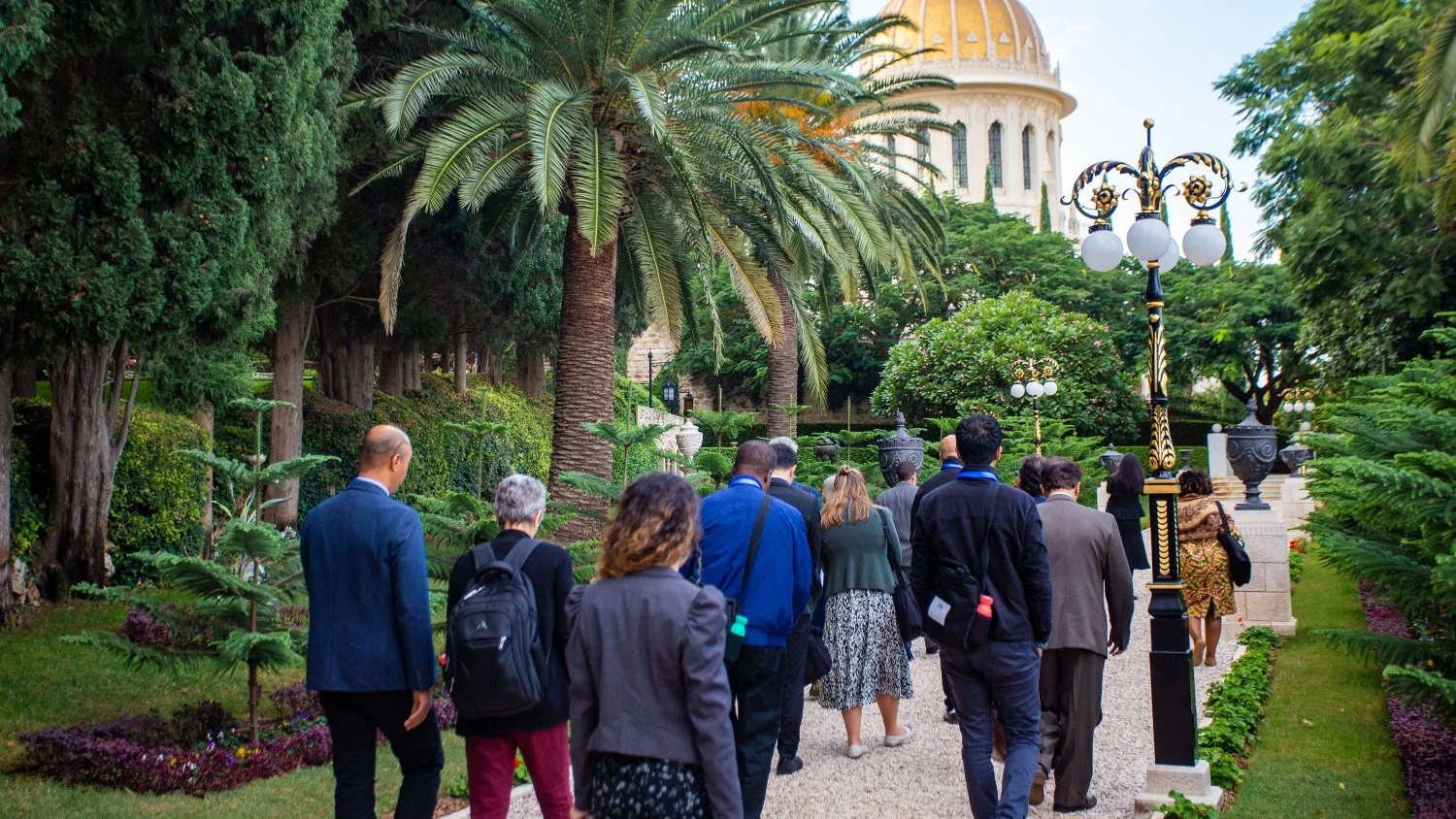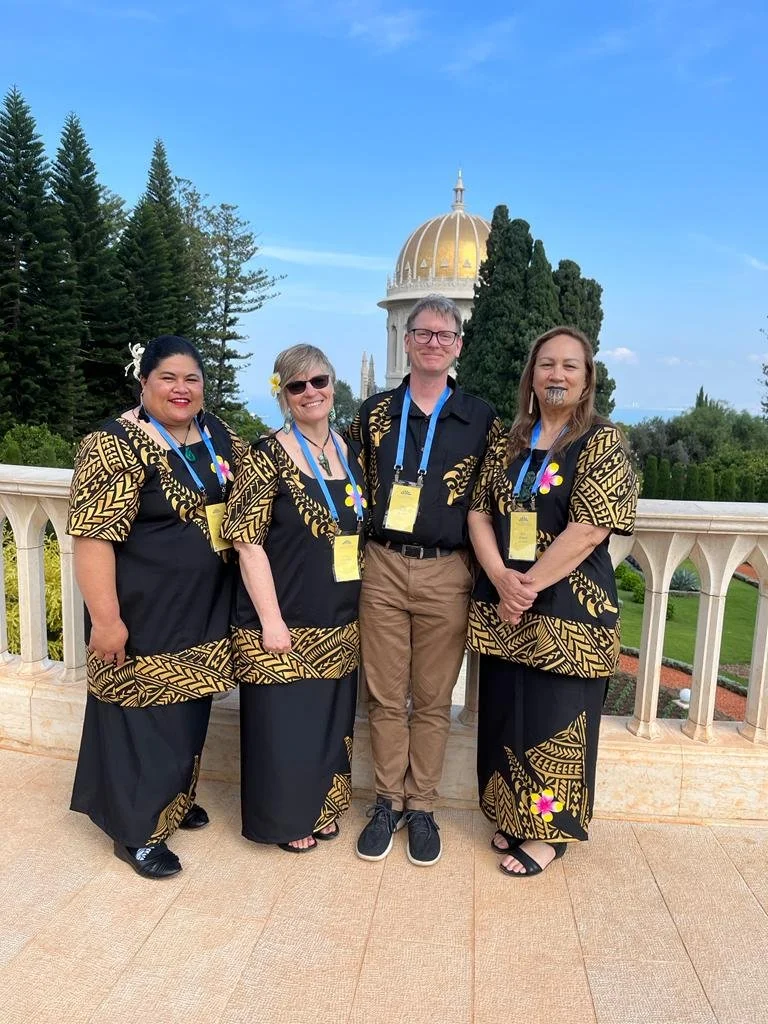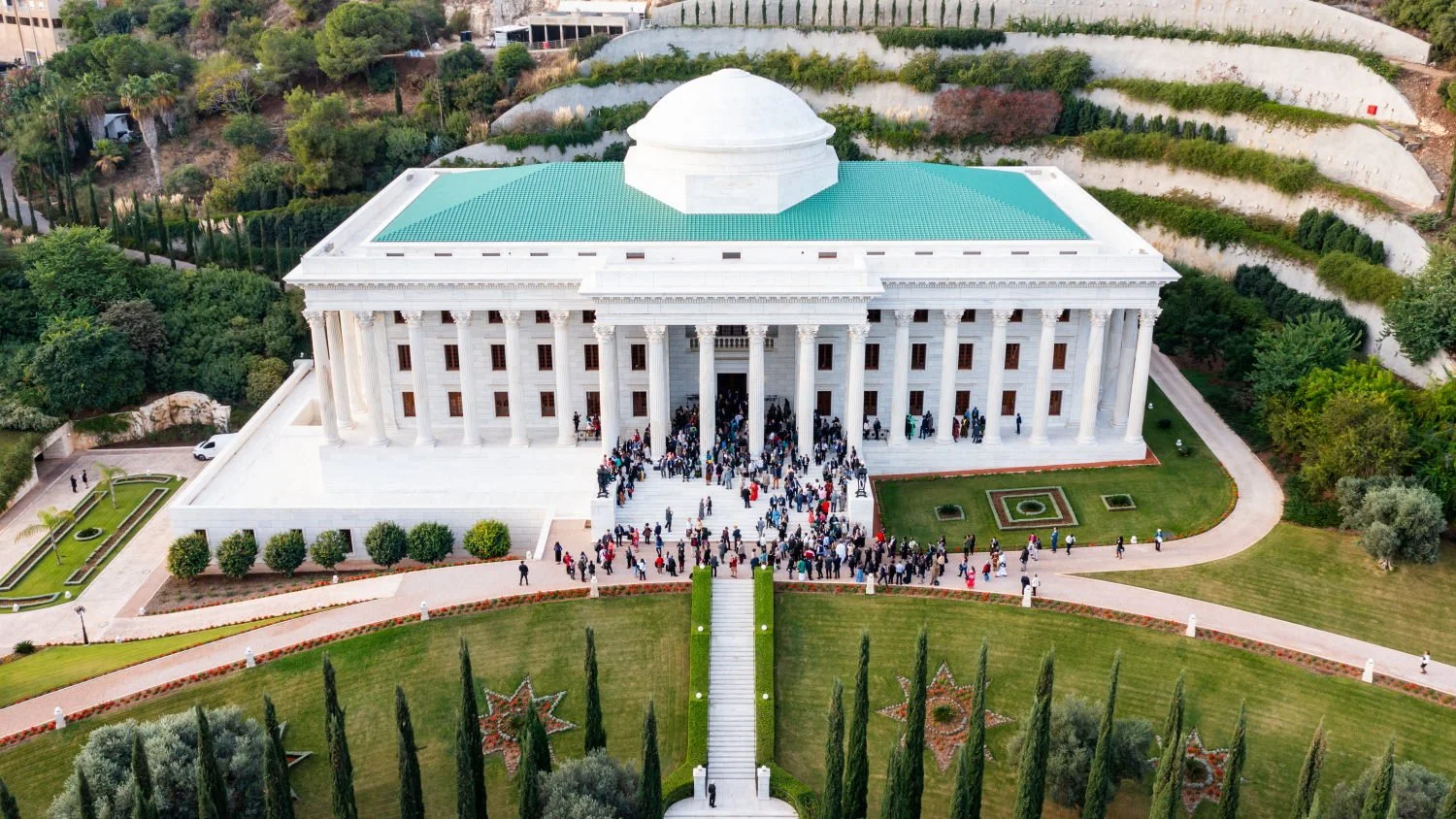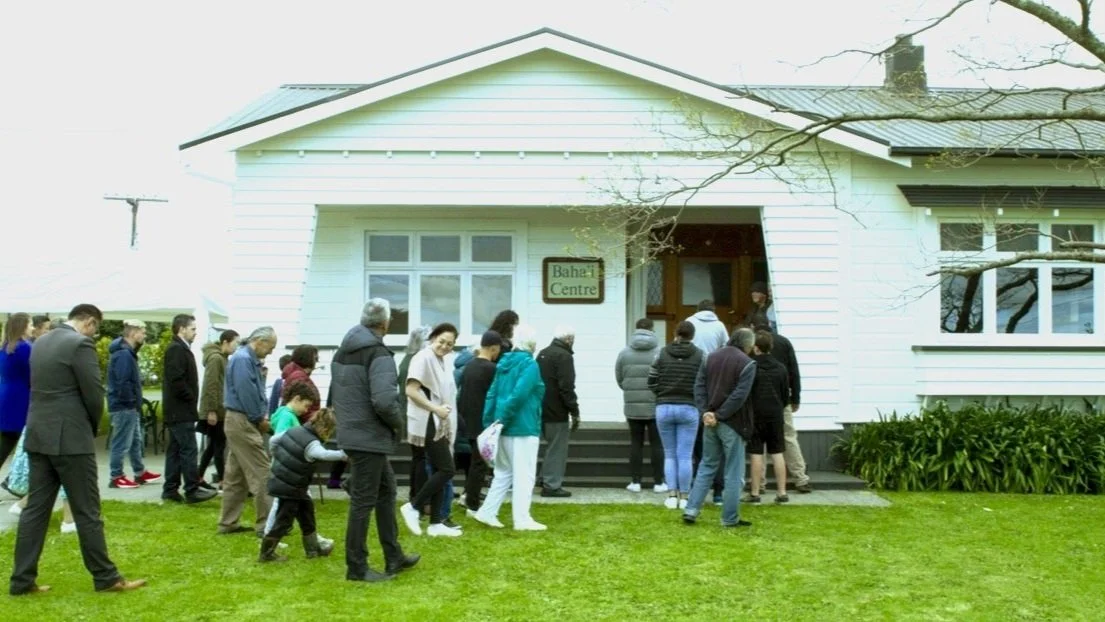Special days of homage to the Centre of the Covenant
Commemorations of the centenary of the Master’s passing have reached their apex this week, with the Day of the Covenant on 4 Qawl and the Ascension of ‘Abdu’l-Bahá on 6 Qawl. The sublime gifts that He left to us are illuminated in the passages below.
Another source of inspiration is recent Bahá’í World News Service reports on commemorations in the Holy Land and elsewhere, including:
Centenary of ‘Abdu’l-Bahá’s passing: Formal program begins after days of spiritual preparation
Centenary of ‘Abdu’l-Bahá’s passing: Representatives prepare themselves in spiritual atmosphere
Houses of Worship: Preparations under way for centenary commemorations
Centenary of ‘Abdu’l-Bahá’s passing: Representatives from around the world arrive
Centenary of ‘Abdu’l-Bahá’s passing: Remembering His life in the Holy Land
Bahá’u’lláh addresses ‘Abdu’l-Bahá
“O Thou Who art the apple of Mine eye!” Bahá’u’lláh, in His own handwriting, thus addresses ‘Abdu’l-Bahá, “My glory, the ocean of My loving-kindness, the sun of My bounty, the heaven of My mercy rest upon Thee. We pray God to illumine the world through Thy knowledge and wisdom, to ordain for Thee that which will gladden Thine heart and impart consolation to Thine eyes.” “The glory of God rest upon Thee,” He writes in another Tablet, “and upon whosoever serveth Thee and circleth around Thee. Woe, great woe, betide him that opposeth and injureth Thee. Well is it with him that sweareth fealty to Thee; the fire of hell torment him who is Thine enemy.” “We have made Thee a shelter for all mankind,” He, in yet another Tablet, affirms, “a shield unto all who are in heaven and on earth, a stronghold for whosoever hath believed in God, the Incomparable, the All-Knowing. God grant that through Thee He may protect them, may enrich and sustain them, that He may inspire Thee with that which shall be a wellspring of wealth unto all created things, an ocean of bounty unto all men, and the dayspring of mercy unto all peoples.”
— Shoghi Effendi, see ‘Abdu’l-Bahá in the words of Bahá’u’lláh
Participants in the centenary programme approaching the Shrine of the Báb, which was constructed under ‘Abdu’l-Bahá’s direction and supervision. It is at this sacred spot where ‘Abdu’l-Bahá’s earthly remains were interred upon His passing. Source: Bahá’í World News Service.
The Master’s life in the words of Shoghi Effendi
He it was Whose auspicious birth occurred on that never-to-be-forgotten night when the Báb laid bare the transcendental character of His Mission to His first disciple Mullá Ḥusayn. He it was Who, as a mere child, seated on the lap of Ṭáhirih, had registered the thrilling significance of the stirring challenge which that indomitable heroine had addressed to her fellow-disciple, the erudite and far-famed Vaḥíd. He it was Whose tender soul had been seared with the ineffaceable vision of a Father, haggard, dishevelled, freighted with chains, on the occasion of a visit, as a boy of nine, to the Síyáh-Chál of Ṭihrán. Against Him, in His early childhood, whilst His Father lay a prisoner in that dungeon, had been directed the malice of a mob of street urchins who pelted Him with stones, vilified Him and overwhelmed Him with ridicule. His had been the lot to share with His Father, soon after His release from imprisonment, the rigors and miseries of a cruel banishment from His native land, and the trials which culminated in His enforced withdrawal to the mountains of Kurdistán. He it was Who, in His inconsolable grief at His separation from an adored Father, had confided to Nabíl, as attested by him in his narrative, that He felt Himself to have grown old though still but a child of tender years. His had been the unique distinction of recognizing, while still in His childhood, the full glory of His Father’s as yet unrevealed station, a recognition which had impelled Him to throw Himself at His feet and to spontaneously implore the privilege of laying down His life for His sake. From His pen, while still in His adolescence in Baghdád, had issued that superb commentary on a well-known Muḥammadan tradition, written at the suggestion of Bahá’u’lláh, in answer to a request made by ‘Alí-Shawkat Páshá, which was so illuminating as to excite the unbounded admiration of its recipient. It was His discussions and discourses with the learned doctors with whom He came in contact in Baghdád that first aroused that general admiration for Him and for His knowledge which was steadily to increase as the circle of His acquaintances was widened, at a later date, first in Adrianople and then in ‘Akká. It was to Him that the highly accomplished Khurshíd Páshá, the governor of Adrianople, had been moved to pay a public and glowing tribute when, in the presence of a number of distinguished divines of that city, his youthful Guest had, briefly and amazingly, resolved the intricacies of a problem that had baffled the minds of the assembled company—an achievement that affected so deeply the Páshá that from that time onwards he could hardly reconcile himself to that Youth’s absence from such gatherings.
On Him Bahá’u’lláh, as the scope and influence of His Mission extended, had been led to place an ever greater degree of reliance, by appointing Him, on numerous occasions, as His deputy, by enabling Him to plead His Cause before the public, by assigning Him the task of transcribing His Tablets, by allowing Him to assume the responsibility of shielding Him from His enemies, and by investing Him with the function of watching over and promoting the interests of His fellow-exiles and companions. He it was Who had been commissioned to undertake, as soon as circumstances might permit, the delicate and all-important task of purchasing the site that was to serve as the permanent resting-place of the Báb, of insuring the safe transfer of His remains to the Holy Land, and of erecting for Him a befitting sepulcher on Mt. Carmel. He it was Who had been chiefly instrumental in providing the necessary means for Bahá’u’lláh’s release from His nine-year confinement within the city walls of ‘Akká, and in enabling Him to enjoy, in the evening of His life, a measure of that peace and security from which He had so long been debarred. It was through His unremitting efforts that the illustrious Badí‘ had been granted his memorable interviews with Bahá’u’lláh, that the hostility evinced by several governors of ‘Akká towards the exiled community had been transmuted into esteem and admiration, that the purchase of properties adjoining the Sea of Galilee and the River Jordan had been effected, and that the ablest and most valuable presentation of the early history of the Faith and of its tenets had been transmitted to posterity. It was through the extraordinarily warm reception accorded Him during His visit to Beirut, through His contact with Midhat Páshá, a former Grand Vizir of Turkey, through His friendship with ‘Azíz Páshá, whom He had previously known in Adrianople, and who had subsequently been promoted to the rank of Valí, and through His constant association with officials, notables and leading ecclesiastics who, in increasing number had besought His presence, during the final years of His Father’s ministry, that He had succeeded in raising the prestige of the Cause He had championed to a level it had never previously attained.
He alone had been accorded the privilege of being called “the Master,” an honor from which His Father had strictly excluded all His other sons. Upon Him that loving and unerring Father had chosen to confer the unique title of “Sirru’lláh” (the Mystery of God), a designation so appropriate to One Who, though essentially human and holding a station radically and fundamentally different from that occupied by Bahá’u’lláh and His Forerunner, could still claim to be the perfect Exemplar of His Faith, to be endowed with super-human knowledge, and to be regarded as the stainless mirror reflecting His light. To Him, whilst in Adrianople, that same Father had, in the Súriy-i-Ghusn (Tablet of the Branch), referred as “this sacred and glorious Being, this Branch of Holiness,” as “the Limb of the Law of God,” as His “most great favor” unto men, as His “most perfect bounty” conferred upon them, as One through Whom “every mouldering bone is quickened,” declaring that “whoso turneth towards Him hath turned towards God,” and that “they who deprive themselves of the shadow of the Branch are lost in the wilderness of error.” To Him He, whilst still in that city, had alluded (in a Tablet addressed to Ḥájí Muḥammad Ibráhím-i-Khalíl) as the one amongst His sons “from Whose tongue God will cause the signs of His power to stream forth,” and as the one Whom “God hath specially chosen for His Cause.” On Him, at a later period, the Author of the Kitáb-i-Aqdas, in a celebrated passage, subsequently elucidated in the “Book of My Covenant,” had bestowed the function of interpreting His Holy Writ, proclaiming Him, at the same time, to be the One “Whom God hath purposed, Who hath branched from this Ancient Root.” To Him in a Tablet, revealed during that same period and addressed to Mírzá Muḥammad Qulíy-i-Sabzivárí, He had referred as “the Gulf that hath branched out of this Ocean that hath encompassed all created things,” and bidden His followers to turn their faces towards it. To Him, on the occasion of His visit to Beirut, His Father had, furthermore, in a communication which He dictated to His amanuensis, paid a glowing tribute, glorifying Him as the One “round Whom all names revolve,” as “the Most Mighty Branch of God,” and as “His ancient and immutable Mystery.” He it was Who, in several Tablets which Bahá’u’lláh Himself had penned, had been personally addressed as “the Apple of Mine eye,” and been referred to as “a shield unto all who are in heaven and on earth,” as “a shelter for all mankind” and “a stronghold for whosoever hath believed in God.” It was on His behalf that His Father, in a prayer revealed in His honor, had supplicated God to “render Him victorious,” and to “ordain … for Him, as well as for them that love Him,” the things destined by the Almighty for His “Messengers” and the “Trustees” of His Revelation. And finally in yet another Tablet these weighty words had been recorded: “The glory of God rest upon Thee, and upon whosoever serveth Thee and circleth around Thee. Woe, great woe, betide him that opposeth and injureth Thee. Well is it with him that sweareth fealty to Thee; the fire of hell torment him who is Thy enemy.”
And now to crown the inestimable honors, privileges and benefits showered upon Him, in ever increasing abundance, throughout the forty years of His Father’s ministry in Baghdád, in Adrianople and in ‘Akká, He had been elevated to the high office of Center of Bahá’u’lláh’s Covenant, and been made the successor of the Manifestation of God Himself—a position that was to empower Him to impart an extraordinary impetus to the international expansion of His Father’s Faith, to amplify its doctrine, to beat down every barrier that would obstruct its march, and to call into being, and delineate the features of, its Administrative Order, the Child of the Covenant, and the Harbinger of that World Order whose establishment must needs signalize the advent of the Golden Age of the Bahá’í Dispensation.
— Shoghi Effendi in God Passes By. See this passage in Bahá’í Reference Library
Featured photo: Participants arrive at the house of ‘Abdu’l-Bahá in Haifa where He resided in the last years of His life, before passing away here in the early hours of 28 November 1921. Source: Bahá’í World News Service (BWNS), copyright © Bahá'í International Community.
The four representatives from Aotearoa New Zealand present in the Holy Land for the Centenary occasion. Left to right: Onna Tangifolau, Diane (Disee) Anorpong, Vahid Qualls, and Huti Watson.








